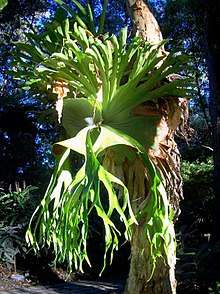Platycerium superbum
Platycerium superbum, commonly known as the staghorn fern, is a Platycerium species of fern. It is native to Australia.
| Platycerium superbum | |
|---|---|
 | |
| Staghorn fern at North Coast Regional Botanic Garden, Australia | |
| Scientific classification | |
| Kingdom: | Plantae |
| Clade: | Tracheophytes |
| Class: | Polypodiopsida |
| Order: | Polypodiales |
| Suborder: | Polypodiineae |
| Family: | Polypodiaceae |
| Genus: | Platycerium |
| Species: | P. superbum |
| Binomial name | |
| Platycerium superbum de Jonch. & Hennipman | |
Distribution
The fern is native to north-east New South Wales (north of Nabiac) and Queensland.[1] It can also be found in parts of Indonesia and Malaysia.[2] In propagated form, the plant is grown successfully as far south as Victoria.[3]
During the 1990s, the fern was also discovered on the Hawaiian Islands where they are now considered a "problem species".[4]
Features
Platycerium superbum is a bracket epiphyte naturally occurring in and near rainforests but is now also widely cultivated as an ornamental plant for gardens.
In both naturally occurring and propagated forms, these ferns develop a humus-collecting "nest" of non-fertile fronds and in doing so can grow up to 1 metre wide. The ferns also develop hanging fertile fronds that can reach up to 2 metres long.[2]
Both fertile and non-fertile fronds are broad and branching and grown to resemble the horns of a stag or elk, thus the common names stag horn or elk horn.[2]
Nutrition
In the wild, the nest structure captures falling leaves and other detritus which then decomposes to provide the plant with nutrients.[3] The ferns are known to favour a slightly acidic environment and so to encourage growth in propagated plants, some growers recommend adding used tea leaves directly to the plant's "nest".[2] Others recommend doing the same with banana peel.[5]
References
| Wikimedia Commons has media related to Platycerium superbum. |
- Platycerium superbum de Jonch. & Hennipman by Peter G. Wilson (National Herbarium of the Royal Botanic Gardens, Sydney)
- Platycerium superbum (Australian Native Plants Society)
- Platycerium superbum by Pippa Lloyd (Australian National Botanic Gardens, 2006)
- Fern Ecology by Klaus Mehltreter, Lawrence R. Walker & Joanne M. Sharpe (Cambridge University Press, 2010)
- Pat Welsh's Southern California Organic Gardening (3rd Edition): Month by Month by Pat Welsh (Chronicle Books, 2009)